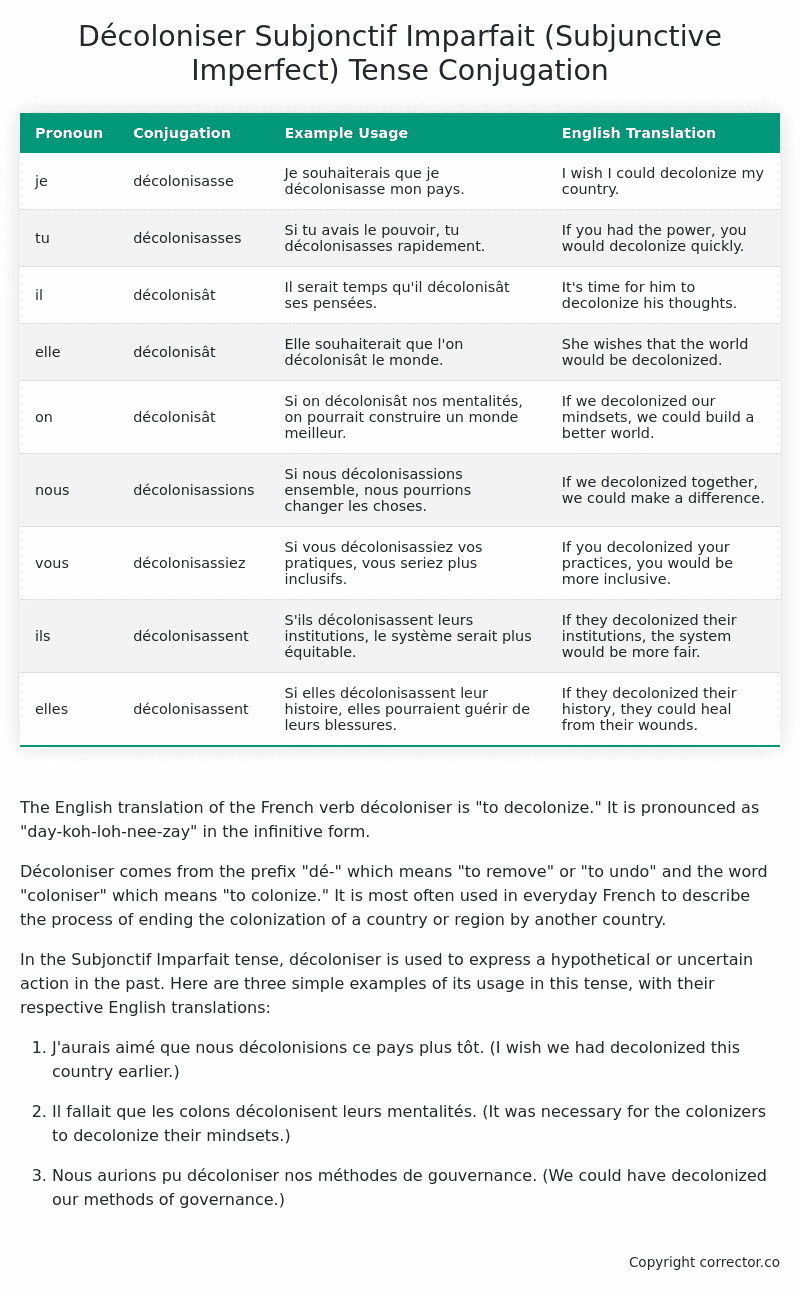Subjonctif Imparfait (Subjunctive Imperfect) Tense Conjugation of the French Verb décoloniser
Introduction to the verb décoloniser
The English translation of the French verb décoloniser is “to decolonize.” It is pronounced as “day-koh-loh-nee-zay” in the infinitive form.
Décoloniser comes from the prefix “dé-” which means “to remove” or “to undo” and the word “coloniser” which means “to colonize.” It is most often used in everyday French to describe the process of ending the colonization of a country or region by another country.
In the Subjonctif Imparfait tense, décoloniser is used to express a hypothetical or uncertain action in the past. Here are three simple examples of its usage in this tense, with their respective English translations:
-
J’aurais aimé que nous décolonisions ce pays plus tôt. (I wish we had decolonized this country earlier.)
-
Il fallait que les colons décolonisent leurs mentalités. (It was necessary for the colonizers to decolonize their mindsets.)
-
Nous aurions pu décoloniser nos méthodes de gouvernance. (We could have decolonized our methods of governance.)
Table of the Subjonctif Imparfait (Subjunctive Imperfect) Tense Conjugation of décoloniser
| Pronoun | Conjugation | Example Usage | English Translation |
|---|---|---|---|
| je | décolonisasse | Je souhaiterais que je décolonisasse mon pays. | I wish I could decolonize my country. |
| tu | décolonisasses | Si tu avais le pouvoir, tu décolonisasses rapidement. | If you had the power, you would decolonize quickly. |
| il | décolonisât | Il serait temps qu’il décolonisât ses pensées. | It’s time for him to decolonize his thoughts. |
| elle | décolonisât | Elle souhaiterait que l’on décolonisât le monde. | She wishes that the world would be decolonized. |
| on | décolonisât | Si on décolonisât nos mentalités, on pourrait construire un monde meilleur. | If we decolonized our mindsets, we could build a better world. |
| nous | décolonisassions | Si nous décolonisassions ensemble, nous pourrions changer les choses. | If we decolonized together, we could make a difference. |
| vous | décolonisassiez | Si vous décolonisassiez vos pratiques, vous seriez plus inclusifs. | If you decolonized your practices, you would be more inclusive. |
| ils | décolonisassent | S’ils décolonisassent leurs institutions, le système serait plus équitable. | If they decolonized their institutions, the system would be more fair. |
| elles | décolonisassent | Si elles décolonisassent leur histoire, elles pourraient guérir de leurs blessures. | If they decolonized their history, they could heal from their wounds. |
Other Conjugations for Décoloniser.
Le Present (Present Tense) Conjugation of the French Verb décoloniser
Imparfait (Imperfect) Tense Conjugation of the French Verb décoloniser
Passé Simple (Simple Past) Tense Conjugation of the French Verb décoloniser
Passé Composé (Present Perfect) Tense Conjugation of the French Verb décoloniser
Futur Simple (Simple Future) Tense Conjugation of the French Verb décoloniser
Futur Proche (Near Future) Tense Conjugation of the French Verb décoloniser
Plus-que-parfait (Pluperfect) Tense Conjugation of the French Verb décoloniser
Passé Antérieur (Past Anterior) Tense Conjugation of the French Verb décoloniser
Futur Antérieur (Future Anterior) Tense Conjugation of the French Verb décoloniser
Subjonctif Présent (Subjunctive Present) Tense Conjugation of the French Verb décoloniser
Subjonctif Passé (Subjunctive Past) Tense Conjugation of the French Verb décoloniser
Subjonctif Imparfait (Subjunctive Imperfect) Tense Conjugation of the French Verb décoloniser (this article)
Conditionnel Présent (Conditional Present) Tense Conjugation of the French Verb décoloniser
Conditionnel Passé (Conditional Past) Tense Conjugation of the French Verb décoloniser
L’impératif Présent (Imperative Present) Tense Conjugation of the French Verb décoloniser
L’infinitif Présent (Infinitive Present) Tense Conjugation of the French Verb décoloniser
Struggling with French verbs or the language in general? Why not use our free French Grammar Checker – no registration required!
Get a FREE Download Study Sheet of this Conjugation 🔥
Simply right click the image below, click “save image” and get your free reference for the décoloniser Subjonctif Imparfait tense conjugation!

Décoloniser – About the French Subjonctif Imparfait (Subjunctive Imperfect) Tense
Formation
Common Everyday Usage Patterns
Interactions with Other Tenses
Subjonctif Présent
Indicatif Passé Composé
Conditional
Conditional Perfect
Summary
I hope you enjoyed this article on the verb décoloniser. Still in a learning mood? Check out another TOTALLY random French verb conjugation!


